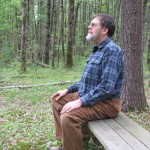Some things that feel odd at the time just get odder after the fact, in hindsight.
There’s this thing that has happened to me a number of times since I became a Quaker. I haven’t heard any other Quakers talk about it, but I bet I’m not alone in having experienced it. For want of a better name, I’ve come to think of it as the Quaker confessional.
Talk to any average person on the street, and if they know one thing about Quakers beyond the oats, they know that Quakers are opposed to war. Probably they think of bonnets, opposition to slavery, and serious Christianity too, but they will almost certainly know that Quakers are opposed to war.
Which certainly makes sense where I’m concerned, since it was “war and the rumors of war” that suddenly and dramatically convinced me to become a Quaker.
What I mean by the “Quaker confessional” is this: from the time that I became a Quaker in my heart–which was well ahead of my becoming formally a member of the Religious Society of Friends–I have found myself sought out on occasion to hear a type of confession, generally from members of the National Guard or another branch of the military.
Typically, what happens is that the soldier in question approaches me privately–some of these exchanges happened in the context of my psychotherapy practice, so we were already private–and expresses a deep respect and admiration for Quakers and their principles. They talk about how much they hate war and violence, and about their opposition to the current war. And they talk about the personal pain they feel at the knowledge that they are going to be sent there to serve.
If asked, I say that I became a Quaker on September 11, 2001, because that is the day that the peace testimony entered my body with the force of a freight train at high speed. But by the time the United States began bombing in Afghanistan, less than a month later, I had already begun to hear these impromptu confessions. The later invasion of Iraq picked up the pace, at least for a while.
My sense is that, at least for some members of the military, I’ve been sought out for a form of expiation, purification. These are experienced soldiers, mainly–my conversations with students thinking of entering the military have had a very different feeling to them.
I find myself thinking of the ritual purification required of, and available to those in antiquity who had taken human life. We have nothing to take that place in modern secular society, at least that I’m aware. Except, maybe, for private discussions with Quakers?
What is particularly odd about this, in hindsight, is that I began hearing these Quaker confessions when I had been attending Quaker meeting for less than a month. True, I had been a practicing psychotherapist for many years, and presumably I’m a good listener. And, true, I talked at length about my conversion to the peace testimony (and to Quakers) with the other members of my religious community. It would not have been a secret that I had a strong interest in peace, nor that I would be willing to listen to those who had something on their hearts.
But I wasn’t exactly seasoned as a Friend. I wonder how much that mattered? And I wonder how much other Quakers have experienced this phenomenon.
And I wonder how well I served the Spirit of Peace in the ways I held and listened to the confidences I heard in the early days of war.
It is probably already clear that I care about and respect very much a number of men and women who have made the decision to become soldiers. I can’t help it: I recognize that, though we see the world differently, many of them have entered their professions with the most idealistic of intentions. In the case of soldiers who have seen combat, it seems to me that I can almost hear their anguish at having taken life, running like a silent river beneath the surface of our conversations. (I find it easier to be a bystander to this pain when it is given words; harder by far when it is denied.)
I know that soldiers have faced pain that I have not; terror that I have not; grief that I have not. My empathy is fully engaged when I am listening to a veteran speaking of their experiences of war, and I think that this is more true since I became a Quaker than it was before, as a knee-jerk liberal (who was, in fact, sometimes a jerk about it).
But I fear, looking back on my early experiences, that I may have bent over a little too far backwards, seeking to accommodate views that I did not share–I may have over-expressed my respect, and under-expressed my concern.
Maybe not. Maybe the Spirit of Peace did a pretty good job guiding me, a novice in the waging of peace, in my conversations with veterans of the terrible art of war. Maybe it is good that, with so little seasoning or eldering as a Friend to guide me, I instinctively allowed love to be the first motion, and stayed close to that guiding spirit of love throughout those conversations.
Maybe it is always more powerful to be peace than to preach peace.
But maybe I should have done more, or I should do more now. Maybe I need to weigh out carefully what the role of a Friend–no longer a newbie Friend, but a Friend of some years–should be, when asked inside the Quaker confessional to listen to a soldier’s heart.
Maybe a little more plain speech was called for from me, and maybe a little more plain speech is called for now. Not that the respect and the tenderness should be set aside: these are still men and women who know terrible things that I have never, myself, learned in the flesh.
But maybe that just makes it harder for them to allow in the quiet voice of Peace, and maybe that just makes it more important for me to share what I have heard that voice say clearly within me.
What is that? What is it that I fear I have not spoken clearly, when it may have been my job to do so?
Is it my job to say words like this?
My friend, I know you have tried to do what you believed was right. I know you are a person of great integrity. I have seen your compassion and I know your heart. I love you.
But I think I am hearing you say that there is a feeling rising up in you that what you are required to do as a soldier is wrong. I know you think that we live in a world where doing terrible and even wrong things is sometimes necessary.
But I think I’m hearing you say that your heart is arguing with your head right now, and, with or without reasons, that your spirit, your soul, is rebelling against the call to war.
And if I am right, and you are troubled in your soul about what you are going to be asked to do, then I think you have a terrible choice to make. It is a worse choice than any I have ever had to make, and I am not qualified to tell you that you must do it. But I think there is that within you that may require it of you.
If you come to believe that you are being used to take life, and that the taking of human life is (as I admit I do believe) simply and always wrong… you must stop. You must not do it. Even if you go to jail. Even if you lose the respect of those who love you. Even if you die, perhaps. Because your soul is more precious even than your life. And you have to do what is right, once you know what that is, regardless of the cost.
(I am not sure I live up to those words. Actually I know that I don’t, though I’m trying to do better.)
I’m not sure of much beyond the truth that has been spoken so often, that there is no way to peace, but that peace is the way; that piling up the bodies in a terrible human sacrifice to peace or safety or justice buys us nothing worth the price, but leads instead to more of the same.
And I’m sure, too, that there is a Source out there that is peace. One great reason to lead each other away from the pits and screes of violence is that that’s the way back to that Source that is calling to us all the time.
Perhaps the best and greatest reason to work for peace is that it brings us closer to God, and that closeness to God is more joy than can otherwise fit into a human heart.
I guess that I can only hope to stay quiet in myself, tender and neither stupidly arrogant (as I can sometimes be) nor overly conciliatory and mealy-mouthed from not wanting to hurt or offend the feelings of a friend. I guess that I can only pray to be helped to be tender and real and open to the leadings of the Light, whenever I next find myself within that Quaker confessional booth, hearing the heart of a friend.















